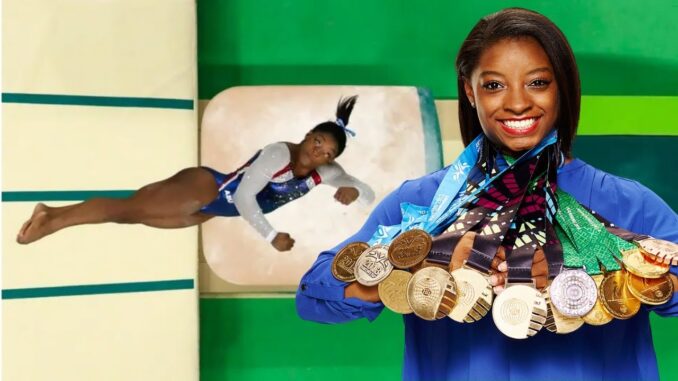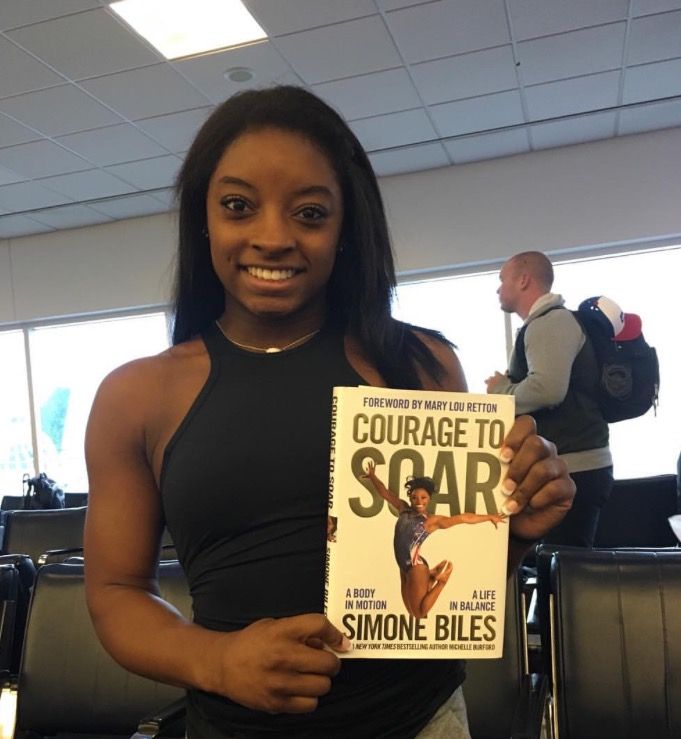
Olympic gold medalist Simone Biles apologized to former college swimmer Riley Gaines after the two engaged in a verbal back-and-forth on X on Friday. In a post Tuesday, Biles apologized for not showing “empathy and respect” in a tweet where she ripped Gaines for the former swimmer’s stance on transgender athletes. In her post, Biles said she believed “competitive equity and inclusivity” are essential in sport. She said she did not want to advocate for policies that “compromise fairness in women’s sports.” Biles added that she took issue with Gaines singling out a child in her post.
Biles ended her post by saying: “Individual athletes — especially kids — should never be the focus of criticism of a flawed system they have no control over. I believe sports organizations have a responsibility to come up with rules supporting inclusion while maintaining fair competition. We all want a future for sport that is fair, inclusive, and respectful.”
Biles and Gaines engaged in a verbal back-and-forth on X on Friday after Gaines attacked Minnesota’s high school interscholastic governing body for allowing a transgender girl to compete in the girl’s state softball tournament. Champlin Park, with the transgender girl on the mound, won the state 4A championship 6-0. Biles responded to that tweet, calling Gaines a “sore loser” and a “bully.”
Gaines — a former swimmer at the University of Kentucky — became a public figure in 2022, when she argued against the inclusion of transgender women participating in women’s sports after she tied for fifth with transgender swimmer Lia Thomas at a meet. Gaines has continued to lobby for that cause, and appeared in a video on the United States Department of Health and Human Services website in February which argued against allowing transgender women to participate in women’s sports. Gaines responded to Biles’ post Friday, calling it “disappointing.” Over the weekend, Gaines tweeted or shared at least 15 tweets mentioning Biles.
Inside the Apology Heard Around the Sports World
Simone Biles — the most decorated gymnast in history — is no stranger to pressure. But this time, the arena wasn’t filled with balance beams and leotards. It was political. Cultural. Deeply personal.
In a recent public statement, Biles shocked both fans and critics by apologizing to former NCAA swimmer and outspoken women’s sports advocate Riley Gaines. The apology came with a message: a call for “competitive equity and inclusivity” in women’s sports — a loaded phrase that has ignited debates, headlines, and hashtags across the internet. So, what exactly did Simone say, and why is everyone talking about it?
What Sparked the Controversy?
The Collision of Two Powerful Voices
Simone Biles and Riley Gaines stand on very different sides of the same field: fairness in women’s sports.
Gaines has made headlines for speaking out against the inclusion of trans women in women’s competitions, claiming it creates an uneven playing field. Biles, on the other hand, has long stood for inclusion, mental health, and social justice — even when it’s unpopular.
Their views clashed publicly when Biles commented on a recent NCAA panel, suggesting that inclusivity doesn’t need to come at the cost of fairness. Riley Gaines called the statement “a slap in the face to women who trained their whole lives.”
Simone Biles’ Public Apology — What She Really Said
A Carefully Worded Message
In her now-viral post, Biles wrote:
“Riley, I hear your concerns. If my words caused you pain or seemed dismissive of your experience, I apologize. My intention has always been to advocate for every woman, for fairness and for inclusivity. These things are not mutually exclusive.”
Biles emphasized that her stance is about expanding the definition of what fairness looks like — not erasing anyone’s experience.
The Reaction Was Instant — And Polarizing
Social Media Erupts
Within minutes, #SimoneBiles and #RileyGaines were trending. Some praised Biles for her grace, while others slammed her for “apologizing to bigotry.” Meanwhile, Gaines responded on X (formerly Twitter):
“I appreciate Simone’s words. It’s a step. But the fight for fairness in women’s sports isn’t over.”
A Nation Divided Over Women’s Sports
This isn’t just about two athletes. It’s about who gets to compete, under what rules, and who defines fairness in 2025.
The Bigger Conversation — What Is ‘Competitive Equity’?
Breaking Down the Term
“Competitive equity” refers to the idea that all athletes should have a fair chance to compete — based on their abilities, not their gender identity. But depending on who you ask, that definition shifts dramatically.
Biles believes it means designing a system that supports both biological women and trans women without exclusion. Gaines believes it requires protecting women’s categories from biological advantages.
A Cultural Tug of War
Sports Are Now the Battleground for Identity Politics
The Biles-Gaines moment highlights the massive rift in American culture: inclusivity vs. traditional definitions of fairness. Where one group sees progress, the other sees regression.
And when two powerful, influential athletes weigh in — it turns into more than a personal feud. It becomes a movement.
Why Did Simone Biles Apologize?
Reading Between the Lines
Simone didn’t have to apologize. She’s Simone Biles — global icon, household name, untouchable in many ways. So why did she?
-
To De-escalate the tension between two communities that often speak past each other.
-
To Clarify that she supports fairness — just not at the cost of excluding others.
-
To Humanize the debate, showing that empathy can exist in disagreements.
Where Does Riley Gaines Stand Now?
Not Backing Down
While Gaines accepted the apology, she’s doubled down on her mission: protecting women’s sports. She’s called for stricter NCAA guidelines and biological sex-based categories.
Gaines’ Strategy Going Forward
-
Appearing at state hearings
-
Leading campus panels
-
Teaming up with athletes who share her stance
How This Affects Young Female Athletes
High School and College Sports in the Crossfire
The conversation is no longer theoretical. Across America, teen athletes are being directly impacted. Some feel inspired by Biles’ inclusivity. Others feel betrayed by what they view as a compromise to fairness.
Policy Confusion in Schools
With mixed rules across states, young athletes are left in limbo:
-
Can trans women compete in girls’ events?
-
Are there separate categories coming?
-
Who decides what’s fair?
The Role of Institutions Like the NCAA
Walking a Tightrope
The NCAA is being pulled in both directions. On one side: inclusivity advocates like Biles. On the other: fairness advocates like Gaines.
So far, their policies remain vague, but mounting pressure is forcing their hand. Many expect updated guidelines before the next championship season.
What Athletes Are Saying
Division in the Locker Room
While some athletes publicly support Biles’ message of inclusion, others quietly side with Gaines. Many are afraid to speak out — fearing career repercussions or online backlash.
Anonymous Voices Speak Up
“I love Simone, but this is bigger than her,” said one anonymous track athlete. “We need rules that make sense.”
What Does Science Say?
Biological Differences Matter — But Context Matters More
Studies show trans women may retain certain advantages after hormone therapy, but the science isn’t settled. Factors like puberty blockers, transition timing, and individual variability make the data muddy.
This leaves governing bodies with a difficult task: crafting rules that reflect both science and ethics.
Is There a Middle Ground?
New Proposals Emerge
Some suggest creating a third category or open division. Others push for better regulation rather than exclusion.
Could this be the future of competitive sports?

What This Means for Simone Biles’ Legacy
Not Just a Champion, But a Changemaker
This moment will forever be part of Biles’ legacy. Whether you agree with her or not, she showed courage by engaging — not avoiding — the controversy.
She’s expanded her role from athlete to advocate.
Conclusion – A Line in the Sand, or a Bridge to the Future?
The Simone Biles-Riley Gaines moment isn’t just about one apology. It’s about how we define womanhood, fairness, and competition in an era of evolving identities. The truth? No one has all the answers. But when two brave women speak their truths — and still find space for apology, clarification, and dialogue — that’s how real progress begins. This conversation is far from over, but at least it’s happening. And maybe, just maybe, that’s a win for everyone.